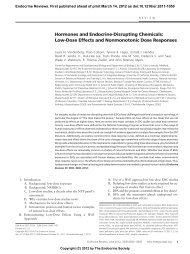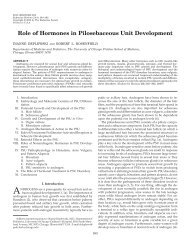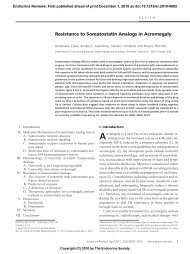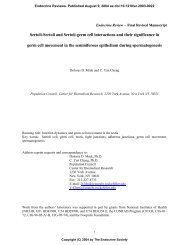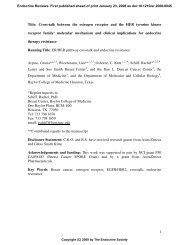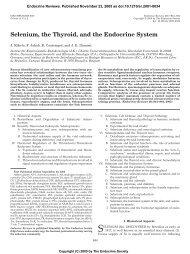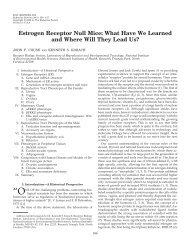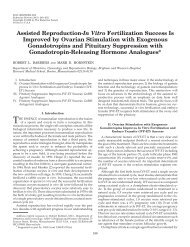1 BETA-CELL FAILURE IN DIABETES AND PRESERVATION BY ...
1 BETA-CELL FAILURE IN DIABETES AND PRESERVATION BY ...
1 BETA-CELL FAILURE IN DIABETES AND PRESERVATION BY ...
You also want an ePaper? Increase the reach of your titles
YUMPU automatically turns print PDFs into web optimized ePapers that Google loves.
7<br />
kindreds (but not similar obese control subjects) exhibit impairment in beta-cell<br />
compensation for obesity-related insulin resistance. Furthermore, the heritability of insulin<br />
secretion is 67% (16).<br />
The demonstration of beta-cell dysfunction before the onset of DM2, as well as the<br />
recognition of the confounding effect of obesity on insulin sensitivity, cast doubt on the<br />
theory that insulin resistance is the primary cause of DM2 (15). Several studies of the<br />
insulin-secretory capacity of glucose-tolerant individuals with a predisposing ethnicity or a<br />
family history of DM2, have indicated that beta-cell dysfunction, like insulin resistance,<br />
occurs in genetically predisposed individuals with normal glucose tolerance - well before<br />
the emergence of overt diabetes (ref. cit in 15). Of note in these studies is the fact that there<br />
were no significant differences with respect to insulin sensitivity between the predisposed<br />
subjects and the control groups (glucose-tolerant subjects with no family history of DM2),<br />
suggesting that alterations in insulin secretion precede insulin resistance in patients at risk<br />
for developing DM2.<br />
Considering that the vast majority (85-90%) of DM2 are obese, and intraabdominal<br />
obesity, being the major determinant of insulin resistance (not only in obese individuals but<br />
also in apparently nonobese individuals who have evidence of increased abdominal fat)<br />
represents a significant genetic component (18) then insulin resistance occurring as a result<br />
of this could be considered genetic. Nevertheless, most obese individuals who are insulin-<br />
resistant are not diabetic and what distinguishes them from those who are diabetic is, as<br />
indicated previously, the ability of their pancreatic beta-cells to compensate for insulin<br />
resistance. Although insulin resistance may be critical for the development of diabetes,<br />
irreversibly impaired insulin secretion plays, as expected, an essential role in diabetes<br />
persistence after weight loss and restoration to normal or near normal insulin sensitivity<br />
(19).<br />
Regarding the 10-15% of patients with DM2 who are not obese, whether they<br />
become diabetic depends on the balance between the severity of insulin resistance and the<br />
ability of the beta-cell to compensate for the insulin resistance, as in the case of obese<br />
individuals. A spectrum could exist: at one extreme, the non-obese individual may be<br />
insulin resistant before or after the development of diabetes. High-fat diet, decreased<br />
physical fitness, increase in visceral fat, smoking, pregnancy, certain medications and



